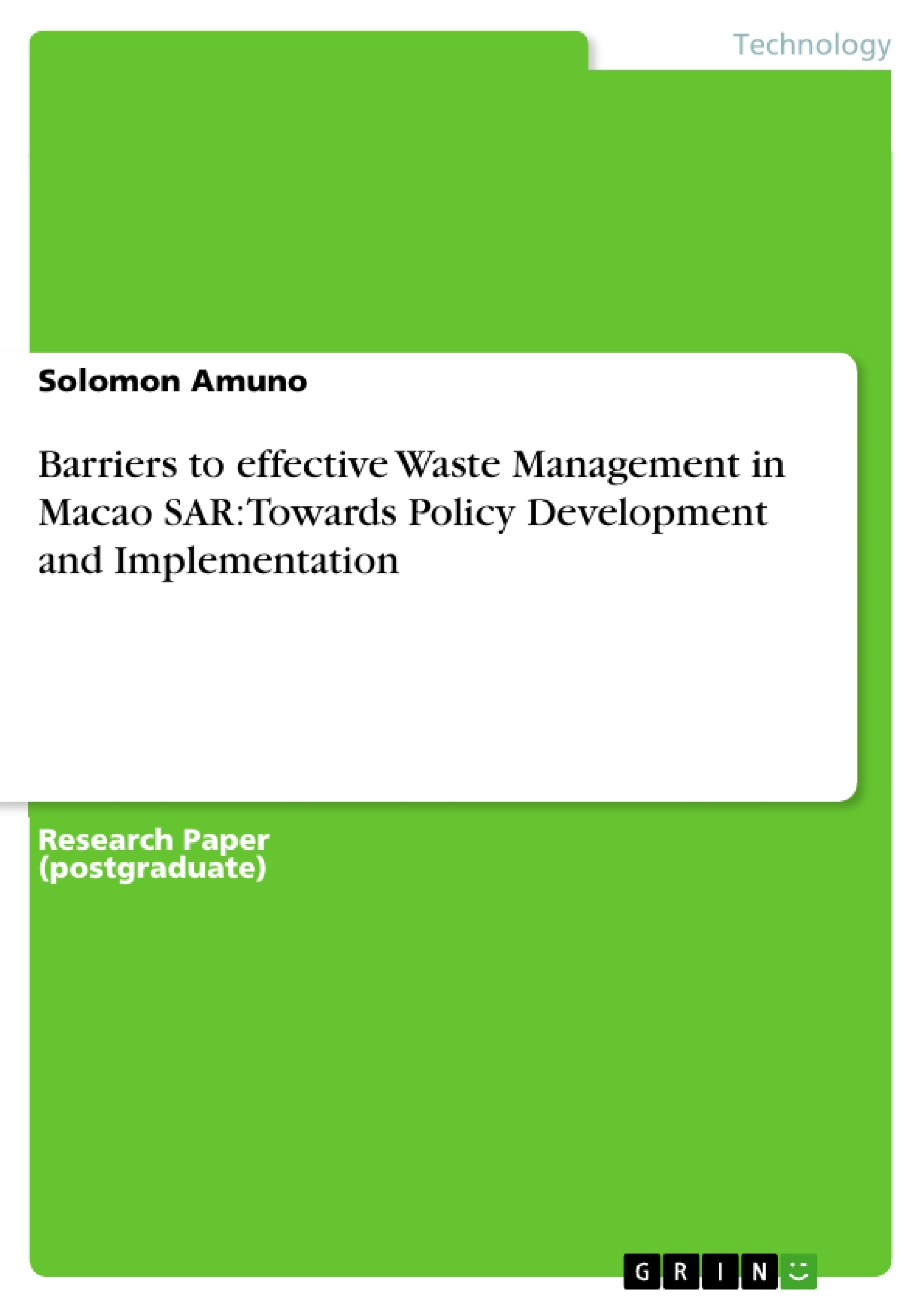Empirical studies have shown that the rapid growth and development of the Macau economy did not only improve the standard of living of the local citizens, but also brought a change in their consumption behavior leading to a high level of solid wastes generation. With a limited land resource and growing population, the government of Macau and local waste management companies are currently faced with the challenge of managing the growing volume of solid wastes generated by the local population. It is therefore the focus of this study to identify and examine the barriers to effective solid waste management in Macau.
Inhaltsverzeichnis (Table of Contents)
- INTRODUCTION
- SOLID WASTE MANAGEMENT IN MACAU SAR
- Solid Waste Management in Macau SAR
- Waste Incineration and Sanitary Landfilling
- BARRIERS TO EFFECTIVE WASTE MANAGEMENT IN MACAU SAR
- Lack of Resources for Waste Management
- Challenges of Waste Collection and Transportation
- Environmental Pollution and Public Health
- Economic Impacts of Waste Management
- POLICY DEVELOPMENT AND IMPLEMENTATION FOR EFFECTIVE WASTE MANAGEMENT IN MACAU SAR
- Development of a Sustainable Waste Management Policy
- Implementation of Effective Waste Management Practices
- Public Awareness and Education
- Regional Cooperation and Collaboration
- CONCLUSION
Zielsetzung und Themenschwerpunkte (Objectives and Key Themes)
This research aims to examine the barriers to effective waste management in the Macau Special Administrative Region (SAR) and explore potential solutions through policy development and implementation. The study focuses on the challenges posed by Macau's rapid economic growth, population increase, and limited land availability, highlighting the need for sustainable waste management strategies.
- Waste management challenges in Macau SAR
- The impact of economic development on waste generation
- Land constraints and their influence on waste disposal methods
- Environmental pollution and public health concerns related to waste
- Policy development and implementation for sustainable waste management
Zusammenfassung der Kapitel (Chapter Summaries)
The first chapter provides an introduction to the study, focusing on the context of waste management in Macau SAR. It outlines the region's economic growth, population dynamics, and the resulting environmental challenges posed by increasing waste generation. The chapter also discusses the significance of sustainable waste management in the region.
Chapter two examines the existing waste management practices in Macau SAR, including the use of waste incineration and sanitary landfilling. It explores the advantages and disadvantages of these methods and discusses the challenges associated with their implementation. The chapter also analyzes the environmental and health impacts of current waste management practices.
Chapter three explores the barriers to effective waste management in Macau SAR. It identifies factors such as land constraints, limited resources, and challenges in waste collection and transportation. The chapter also discusses the economic impacts of waste management, including the costs associated with waste disposal and the potential for resource recovery.
Schlüsselwörter (Keywords)
Key terms and concepts explored in this study include waste management, Macau SAR, sustainable development, economic growth, population growth, land constraints, waste incineration, sanitary landfilling, environmental pollution, public health, policy development, and implementation.
Frequently Asked Questions
What are the main waste management challenges in Macau?
Macau faces limited land resources, a growing population, and a high volume of solid waste generated by rapid economic development and changing consumption behaviors.
How does economic growth affect waste generation in Macau?
The improved standard of living has led to increased consumption, which directly correlates with a surge in solid waste production that exceeds current disposal capacities.
What are the primary waste disposal methods currently used?
Macau primarily relies on waste incineration and sanitary landfilling, both of which face challenges due to environmental concerns and lack of available space.
What are the barriers to effective waste management?
Key barriers include a lack of resources, challenges in collection and transportation, and the urgent need for more sustainable public policies.
What solutions are proposed for Macau's waste problem?
The study suggests developing sustainable waste policies, increasing public awareness and education, and fostering regional cooperation for better resource recovery.
- Arbeit zitieren
- Solomon Amuno (Autor:in), 2010, Barriers to effective Waste Management in Macao SAR: Towards Policy Development and Implementation, München, GRIN Verlag, https://www.grin.com/document/145090



